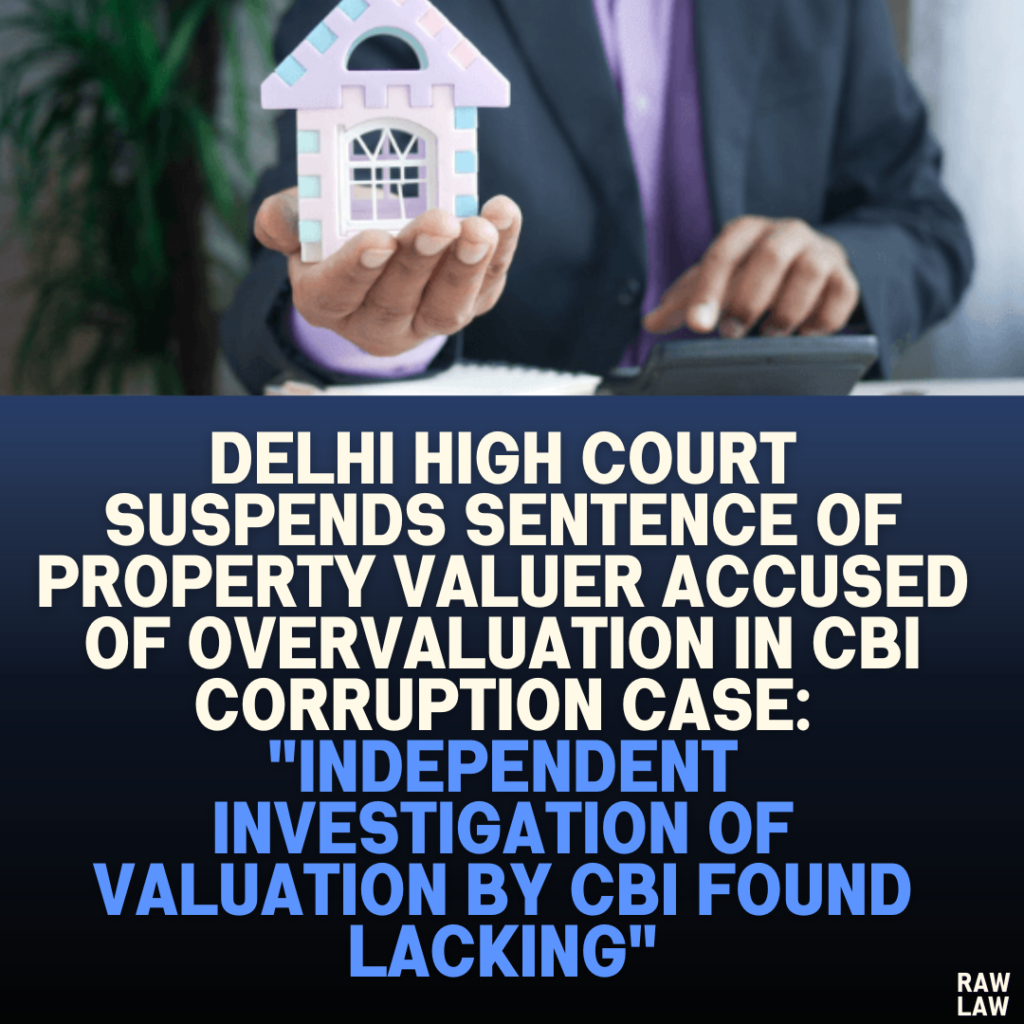Court’s Decision
The Delhi High Court granted the suspension of the sentence for the appellant, a property valuer convicted for allegedly overvaluing property in a corruption case. The conviction was under Section 120-B (Criminal Conspiracy) read with Section 420 (Cheating) of the Indian Penal Code (IPC) and Section 13(1)(d) of the Prevention of Corruption Act, 1988. The court found critical gaps in the investigation conducted by the CBI, including the absence of an independent assessment to verify the claims of overvaluation.
Facts
- The case arose from a credit facility availed by a borrower, Sudhir Kumar Arora, under a corporate overdraft scheme of Corporation Bank (now Union Bank of India).
- The appellant, a property valuer, prepared a valuation report estimating the property’s value at ₹4.82 crore, which was submitted as collateral for a loan of ₹3.10 crore.
- The CBI alleged that the valuation was exaggerated, enabling undue financial gain for the borrower, and that the valuation report falsely claimed that the borrower was the property’s exclusive owner.
- Subsequent valuations by other experts pegged the property value much lower:
- ₹1.45 crore (Amarjeet Singh).
- ₹1.32 crore (Ashutosh Nirmal).
- The property was eventually auctioned for ₹1.27 crore in 2024.
Issues
- False Valuation: Was the valuation report prepared by the appellant deliberately inflated?
- Ownership Misrepresentation: Did the appellant wrongly state that the borrower was the property’s exclusive owner?
- Independent Investigation: Did the CBI adequately investigate the alleged overvaluation of the property?
- Suspension of Sentence: Should the appellant’s sentence be suspended pending the disposal of the appeal?
Petitioner’s Arguments
- Subjective Nature of Valuation:
- The valuation of property is inherently subjective and time-sensitive, influenced by market dynamics, economic conditions, and the purpose of valuation.
- A valuer’s report cannot be deemed “false” solely because subsequent valuations yield lower figures.
- Lack of CBI Investigation:
- The CBI did not conduct any independent investigation to verify the alleged overvaluation.
- The investigating officer (IO) admitted during cross-examination that no independent valuation or market analysis was conducted to corroborate the claim.
- Non-Responsibility for Ownership Verification:
- A valuer’s role does not include verifying the legal ownership of the property. This responsibility lies with the lending institution.
- Parity of Treatment:
- The borrower, a co-convict, had already been granted suspension of sentence pending appeal. The appellant sought similar relief on the grounds of parity.
Respondent’s Arguments (CBI)
- Overvaluation of Property:
- The appellant, who was not an approved valuer, significantly overvalued the property to facilitate the loan.
- Two independent valuers reported much lower figures for the property’s worth.
- False Ownership Claims:
- The valuation report incorrectly stated that the borrower was the exclusive owner of the property on the date of valuation. Records showed the borrower only became the legal owner later.
- Concerns Over Professional Integrity:
- Emails and letters from third parties, including the Director of S&G Advisory Services Pvt. Ltd., had cautioned the bank about the appellant’s alleged illegal activities.
Analysis of the Law
- Expert Opinions under Section 45, Indian Evidence Act:
- The court emphasized that expert testimony must be corroborated by independent and reliable evidence.
- It was noted that the CBI failed to conduct an independent verification of the appellant’s valuation.
- Role of a Valuer:
- A property valuer provides opinions on market value based on various factors. Discrepancies in valuations are common due to changes in market conditions and methodology.
- Lack of Due Process:
- Emails and letters cited by the CBI to discredit the appellant were neither exhibited during the trial nor presented to the appellant under Section 313 of the Cr.P.C.
Precedent Analysis
- The court examined the standard for evaluating expert testimony and its admissibility.
- It emphasized that mere reliance on differing expert opinions without independent verification is insufficient to establish guilt.
Court’s Reasoning
- Independent Investigation:
- The investigating officer admitted during cross-examination that no independent valuation or market analysis was conducted to verify the appellant’s valuation.
- The CBI failed to examine the rationale behind the appellant’s valuation.
- Subjective Nature of Valuation:
- The appellant’s valuation could not be deemed “false” based on subsequent valuations prepared in different years under different market conditions.
- Equal Treatment:
- The court noted that the borrower’s sentence had already been suspended on appeal and extended similar relief to the appellant on grounds of parity.
- Insufficient Evidence:
- The court found no conclusive evidence to suggest that the appellant’s valuation report was objectively false or prepared with fraudulent intent.
Conclusion
The Delhi High Court suspended the appellant’s sentence pending appeal, subject to the following conditions:
- Payment of the fine imposed by the trial court, if not already paid.
- Submission of a personal bond of ₹5,00,000 along with one surety.
- Provision of a mobile number to the investigating officer and ensuring it remains active.
- Residence at the address listed in prison records, with prompt notification of any changes.
- Surrender of the appellant’s passport and a restriction on international travel without prior court permission.
- Assurance of lawful behavior during the pendency of the appeal.
Implications
- Due Process in Investigations:
- The judgment underscores the importance of independent verification in cases involving expert testimony.
- Safeguarding Professional Roles:
- The court clarified the limited responsibilities of property valuers, distinguishing their role from legal verifiers of ownership.
- Judicial Caution:
- The suspension of sentence reflects a cautious approach when convictions are based on subjective assessments without corroborative evidence.
